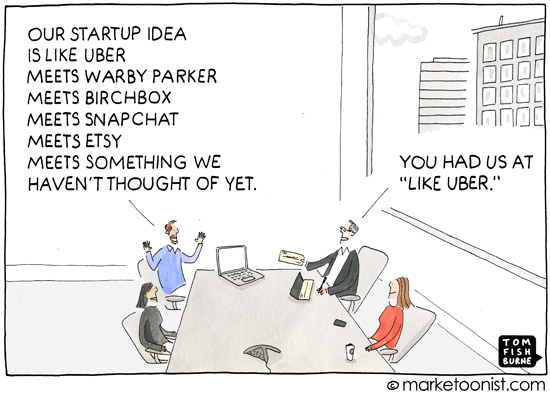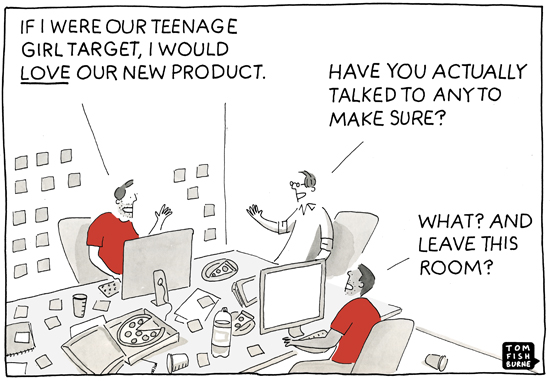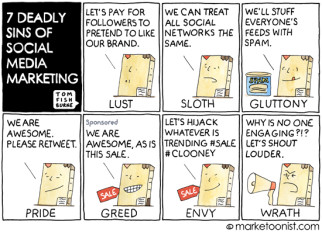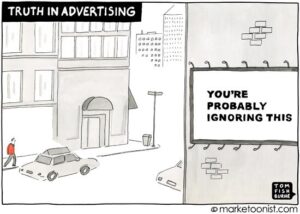It has never been easier to start a business. The infrastructure is in place to get businesses going for lower investment than just about any time in history.
Yet that doesn’t mean that every startup is worth starting. There is a skewed sense of reality (particularly where I live near San Francisco) that capital seems to reward startup ideas for very low levels of validation.
Many pitches are structured around trying to be the next (insert successful startup here) for (insert category here). I understand the appeal of framing new ideas around successful models. But I crack up every time I hear a startup described as “the Warby Parker for” everything from men’s socks to headphones to active wear to art framing to furniture. This week’s cartoon was partly inspired by Vooza’s hysterical take on an entrepreneur trying to invent the next “Like Uber For” mobile app.
In the startup bandwagon, companies sometimes miss the marketing basics. One of the basics that I think gets missed is understanding your customers. There is a sense in startup culture that if you build it, they will come.
I’ve been thinking about this dynamic recently while illustrating cartoons for a new book called “Talking to Humans: Success Starts With Understanding Your Customers”, written by Giff Constable (CEO of Neo) and edited by Frank Rimalovski (Executive Director of the NYU Entrepreneurial Institute). It’s a short handbook on how to talk to customers in the earliest stages of a startup to validate and shape the idea. You can download the PDF for free or find Kindle and Paperback versions. Here’s one of my cartoons from the series.
Startups sometimes place more emphasis on what might sound good to investors than on actually validating their idea with customers. I’d love to hear your thoughts on startup ideas worth starting.
(Marketoonist Monday: I’m giving away a signed cartoon print. Just share an insightful comment to this week’s post by 5:00 PST on Monday. Thanks!)




Steve Schildwachter says
Tom, great observations sketched brilliantly as usual. You’re “the JibJab of marketing punditry”!
Your post this week really struck a chord because a year or so ago I jumped from Ad Land to Startup Land, and have observed exactly this kind of sales pitch. What really amazes me, however, is how easily these pitches seduce wealthy, intelligent venture capitalists. I get the impression that all they have to hear is some big buzz word — “Big Data!” “Mobile” “Programmatic Media” — to get interested. Even more amazing: Not all investors do their homework, asking questions like “How well do you understand your customers?” Most of the questions focus on things investors understand, like revolving credit facilities and secured debt.
My advice to anyone investing in a startup or taking a job at one would be to ask and answer three simple questions. (1) What am I selling? (2) To whom am I selling it? (3) With whom do I compete for the sale?
In other words: Marketing 101.
Scott Monty says
One that got me was when I heard “like Netflix for books.” My reaction: that already exists. It’s called the library.
Think people. Think.
Brian O'Connor says
This reminds me of the Cards Against Humanity card:
“Let me tell you about my new startup. It’s basically ___________, but for __________.”
This also translates to other cities outside of SF. I’ve worked in NY and Atlanta and can’t tell you how many times I’ve been approached by an “entrepreneur” with an idea that is the new social network for ______. I find it funny that as the tech guy that I’m more focused on users and adoption than the person with the novel idea.
I’m an advocate of pursuing ideas but make sure to validate. This post really hits the proverbial nail on the head. Well put, Tom. Well put.
http://techcrunch.com/2014/04/14/the-most-overused-startup-pitch-becomes-a-cards-against-humanity-card-but-you-probably-wont-ever-see-it/
Ori Pomerantz says
One of the big problems with people doing startups is they tend to think of investment as an end, when it is just a means to an end. Ultimately, the purpose isn’t to raise money from investors but to earn money from customers, or sell the organization to a company that will earn money from customers.
BTW, a good source of information about startups is the writing of Paul Graham, for example http://paulgraham.com/fr.html .
Connie says
Part of the problem, though, is that a lot of business-y types ask for those stupid comparisons.
A little while ago my husband was doing his MBA capstone, with a “find a tenant” service for apartment buildings. He went in front of the typical investors (just like I did) proposing the project. They didn’t get the idea and asked him for one of those comparisons. He ended up with “like Match.com for landlords and tenants” and then got the buy in. Afterward, though, he said to me that he felt silly for having to go there and that he felt like the investors weren’t paying attention until he had to make the stupid comparison – so they missed all the data about the identified customers, how they meet the customer’s needs, etc.
And I was in a meeting yesterday for a non-profit describing enhancements to the websites. I listened closely to the data presented, and then at the Q&A, some guy piped up with “like Facebook meets Etsy for non-profits?” and I literally smacked my head.
Its a way of thinking that we’re training people to do, and its not a good thing. Not everything has to be like something else.
Eric says
Your second cartoon really struck a chord with me. I’ve been in marketing for 20 years. I’ve rolled out products and developed strategies, set budgets, etc. The part that still baffles me to this day is how hard it is to convince myself and others that my number one priority is to understand my customer. As a marketer, if I were to put money in my budget to “visit potential customer” or “observe customer in native habitat”, I would get laughed at. Even knowing that this should be my utmost priority, the organization would rather allocate money to development to make “anything” versus spend money to truly understand what the customer needs and / or wants. Your cartoon with the marketing folks not leaving the conference room is very true in way too many cases.
Tracy Lloyd says
First of all, I love your work and we share it all the time on our blog. This one especially resonates with me as we work with a lot of startups and our job is to help them out of this rabbit hole by building a brand strategy which requires us to answer a lot of tough questions that often have answers like the 1st cartoon This cartoon nails it for me. Sadly, I hear we are like_________ for _______ more than I care to admit — making the work we do for our clients hard, but valuable if we can get to the answers!!
Frido van Driem says
Great blogpost Tom,
I think the problem is that startups don’t pitch their product based on their personal story. Why did you started this company? If you tell your story people can feel the pain you have experienced and how you have solved it by starting your company. I have just published my story on how I started my startup ZEEF: “How to build a startup”
http://zeef.org/2014/10/20/how-to-build-a-startup/
Also a lot of startups don’ use their own product. They build it and think other people will use it. That were things are going wrong….
chris says
The second joke about not leaving the room seems ridiculous…then I remembered two places I’ve been in contact with that did the exact same thing: Using complex graphs & acronyms, to justify not changing or interacting. Sometimes making calls on things in the same way at the main cartoon, ‘well if I was the TA then…’.
I noticed that, even with the limited target audience definition for a particular product, only one person out of a group of 20+ had actually been in any contact with this group in the previous 10 years. In the other place I thought of, no one had ever come into contact with the identified target audience!
Interestingly, both places no longer exist.